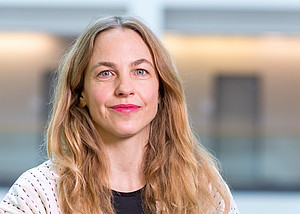Appointment as Professor of Medical History and Medical Museology

Berlin, 01.03.2024
Prof Monika Ankele took over the Chair of Medical History and Medical Museology at Charité – Universitätsmedizin Berlin on 1 March. This is linked to the management of the Berlin Medical History Museum (BMM) of the Charité. Prof Ankele comes from the Medical University of Vienna and succeeds Prof Thomas Schnalke, who has held the professorship since 2000 and is now retired.
Prof. Ankele is a historian and was most recently a research associate in the Ethics, Collections and History of Medicine organisational unit at the Medical University of Vienna (Josephinum). Born in Austria, she is looking forward to the move to the Charité: “I am delighted to take over the management of the modernised and reopened BMM. My aim is to strengthen the museum as an interface between the hospital and the public and to develop it into a centre that is open to critical reflection by researchers, doctors, artists, students and civil society.” She adds: “I will also focus on the connections between art and medicine in the exhibitions and research. I would also like to draw on the Charité art collection for this. The first exhibitions I am planning will take a look at medicine from the patient’s perspective and will also incorporate artistic research approaches.”
The 45-year-old explains her research interests: “My research focuses on objects and with them the material culture of medicine: how do objects frame medical action, how do they shape doctor-patient relationships, how do they characterise the experience of illness and what ethical dimensions are inscribed in them? The approach via objects makes it possible to combine different perspectives on medicine and its history. A good example of this is my research on hospital beds and the testimonies of patients in psychiatric institutions.”
Prof Ankele also represents the medical-museological subject area with a focus on the 18th to 21st centuries in teaching: “The museum with its medical history collections and exhibitions offers an ideal starting point for teaching that is based on the objects and, following the pathologist and museum founder Rudolf Virchow, is oriented towards the training of seeing. I want to make students aware of the material dimension of medicine and the cultural, social and ethical aspects inscribed in it. I also want to open up the museum and its collections as a place of learning for students and give them space for their approaches and reflections in the museum and in the exhibitions.”
Short vita
Monika Ankele was born on 5 November 1978 in Wolfsberg, Austria. From 1997 to 1999 she studied History and Cultural Management at the Karl-Franzens-University Graz. From 1999, she continued her studies in history and a combination of art history, theatre, film and media studies and journalism at the University of Vienna, graduating in 2004. In 2008, Monika Ankele completed her doctorate at the Institute of History there on the subject of “Everyday life and appropriation. Women in psychiatric wards around 1900: testimonies from the Prinzhorn Collection.” From 2001 to 2012, she was a museum educator at the Museum Moderner Kunst Stiftung Ludwig in Vienna and from 2009 to 2012 a lecturer in cultural studies and women’s and gender studies at the University of Vienna. She then worked as a research assistant at the Institute for the History and Ethics of Medicine at the University Medical Centre Hamburg-Eppendorf until 2020, where she also taught from 2018 to 2020 and worked as a curator at the Hamburg Museum of Medical History. She then became a university assistant at the Ethics, Collections and History of Medicine organisational unit at the Medical University of Vienna. In 2022, together with Prof. Céline Kaiser, she founded the Institute for Medical & Health Humanities and Artistic Research, an affiliated institute of the Hochschule für Künste im Sozialen, Ottersberg.
Berlin Museum of Medical History of the Charité
The BMM on the Charité Mitte campus emerged from Rudolf Virchow’s Pathological Museum, which opened in 1899. It provides visitors with fascinating insights into the development of medicine over the last 300 years. The permanent exhibition features around 750 pathological anatomical wet and dry specimens as well as models and illustrations from central medical activity rooms, such as the Anatomical Theatre, the Anatomical Museum, the laboratory and the infirmary. The BMM also offers changing special exhibitions: Until 8 September 2024, “The Brain in Science and Art” and the intervention exhibition “THERE IS SOMETHING. Cancer and Emotions” can be seen.
The museum building was substantially modernised between 2020 and 2023 and equipped with contemporary museum technology. The spacious display case windows, the entrance area and the forecourt were also redesigned.
Photo Credit: Prof. Monika Ankele. © Charité | Artur Krutsch
